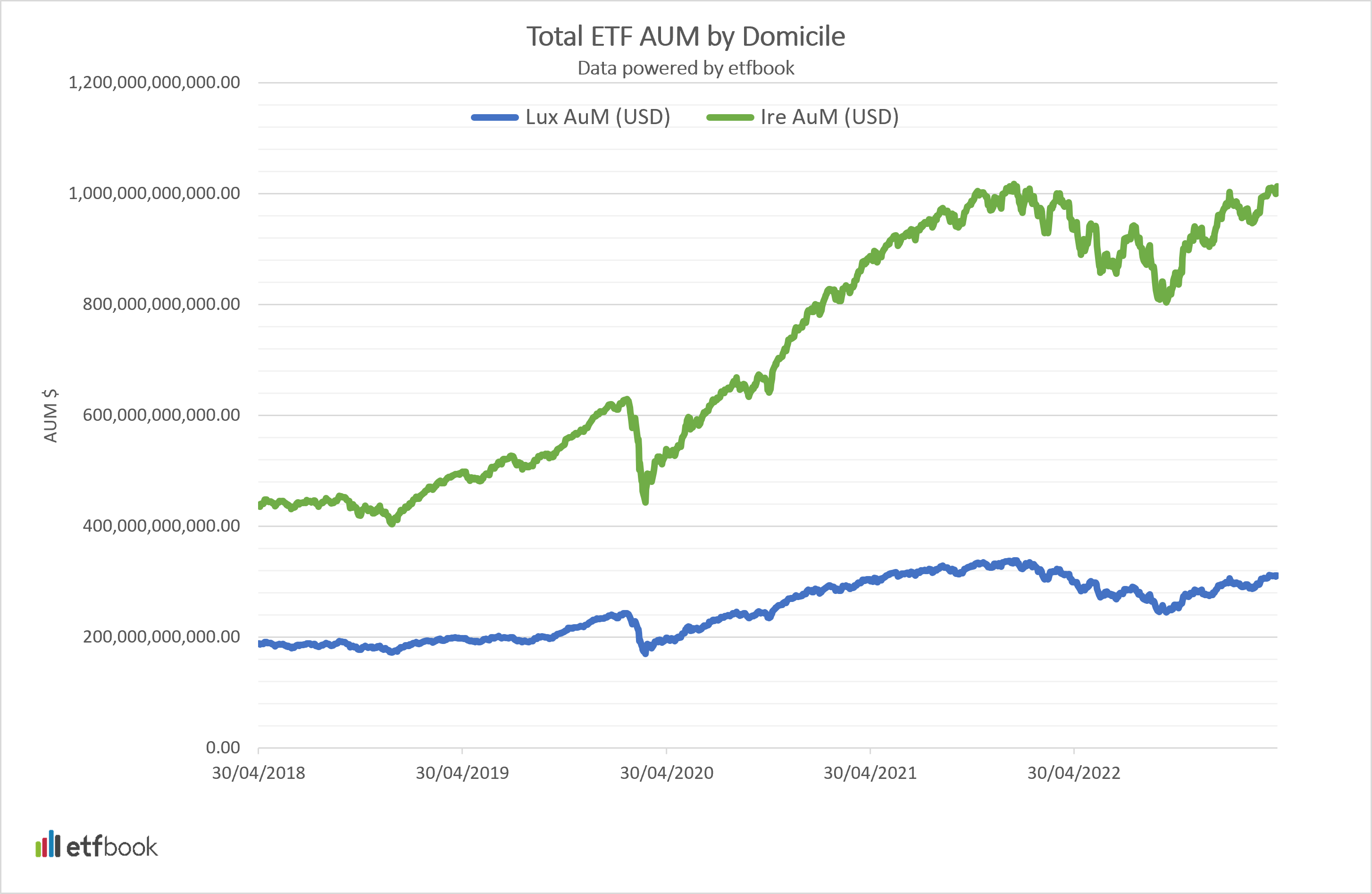
Ireland has cemented itself as the biggest international ETF domicile – leaving challengers such as Luxembourg having to play catch up. Some Dublin-based fund specialists, however, believe that Luxembourg is not entirely left without options.
Assets under management in Ireland-domiciled UCITS ETFs reached 953 billion dollars as of December 31, 2022, according to ETFbook, whereas Luxembourg accounted for 277 billion dollars. When comparing the data from the end of 2018 to the end of 2022, Ireland experienced a growth of 124 percent, whereas Luxembourg saw a growth of 58 percent.
Why is the Emerald Isle living up to its name?
 The growth spurt in the Irish scene is “most likely” to have started along with the Irish Collective Asset-management Vehicle (ICAV) introduction in early 2015, according to Santa Zvaigzne-Sproge of investment company Conotoxia Ltd.
The growth spurt in the Irish scene is “most likely” to have started along with the Irish Collective Asset-management Vehicle (ICAV) introduction in early 2015, according to Santa Zvaigzne-Sproge of investment company Conotoxia Ltd.
“It holds numerous benefits, such as its separate legislation from other Irish companies shielding it from any changes in Irish as well as European company law. But the key benefit seems to be related to tax benefits for both investors and investments related to the US.”
Exempted from PFIC regime
The ICAV is particularly appealing to US investors, Santa Zvaigzne-Sproge says, because of its simplified tax treatment. By allowing taxable US investors to be in the same tax position as if they had directly invested in the underlying assets, the ICAV provides access to US tax treaty relief and the use of tax credits associated with fund investments.
Ireland also exempts US investors from the complex Passive Foreign Investment Company (PFIC) regime, Santa Zvaigzne-Sproge explains. This is made possible because the ICAV can elect to be treated as a ‘pass-through’ entity for US federal income tax purposes under the ‘check the box’ rules.
“While an ICAV can elect to be a ‘pass-through’ entity for US federal income tax purposes, it is generally recognized as a corporate entity in most other jurisdictions,” Santa Zvaigzne-Sproge asserts.
“Many jurisdictions offer more favourable tax treatments for dividends and gains on share transfers to corporate entities like the ICAV, whereas non-corporate entities like unit trusts may not be recognized for treaty access in certain cases.”
Lower withholding tax rate
Probably the most important detail is that the US-Ireland tax treaty benefits not only US investors but also US financial instruments. US equity ETFs that are domiciled in Ireland pay a 15 per cent withholding tax (WHT) rate on dividends instead of 30 per cent as it is for ETFs domiciled in Luxembourg and other European jurisdictions.
This particular treaty has been in existence with the US many years before ETFs first came to Ireland at the turn of the century.
 Paul Heffernan is CEO of Waystone ETFs, which is headquartered in Dublin, and has been involved in the sector “from the very beginning”. In 2000, he was part of a domestic Irish bank, Bank of Securities Services, that helped Barclays Global Investors launch their very first iShares ETFs in Europe.
Paul Heffernan is CEO of Waystone ETFs, which is headquartered in Dublin, and has been involved in the sector “from the very beginning”. In 2000, he was part of a domestic Irish bank, Bank of Securities Services, that helped Barclays Global Investors launch their very first iShares ETFs in Europe.
Why has Ireland cemented itself as the biggest international ETF domicile? “There's a few different reasons. It just so happened that ETFs worked with the existing US treaty and could avail of the lower WHT rates.
‘It started with luck’
“But first of all it started with luck: Barclays Global Investors (BGI), as well as Merrill Lynch back in 2000 were early movers in Ireland. They already ran a range of mutual funds and money market funds and index funds out of the Dublin domicile.
“It was a natural part of growing out their footprint in Ireland by going into ETFs.”
For Heffernan the favourable WTR has been an important feature of Ireland maintaining and growing the percentage share of assets under management (AUM) through the number of funds, according to the Central Bank of Ireland, stood at 1,340 as of March 31 2023.
“Through good judgement, skills, strong regulatory framework and a bit of luck it has built up some expertise through service providers and regulators, alongside asset managers bringing ETF products to market,” Heffernan says.
“There's now an understanding that we have an incredible ETF industry ecosystem.”
Of course, Ireland has one of the most competitive corporate tax rates in the European Union at 12.5 percent. It also has a broad network of double taxation treaties with over 70 countries, including all major economies.
‘A nice ETF stew’
Ireland was one of the first countries to adopt the Undertakings for Collective Investment in Transferable Securities (UCITS) directive, a regulatory framework in the EU that allows funds to be sold to any investor within the EU under a harmonised regulatory regime.
Heffernan adds: “When you combine the specialist knowledge of ETFs with the favourable tax regime and a regulatory regime that understands the depth of the framework, bringing all that together makes for a nice ‘ETF stew’.”
While he rejects the notion that Brexit has yielded specific benefits, he says the move has left Ireland as one of the best English-speaking jurisdictions within the EU, providing accessibility for global investors.
“We also have a highly skilled and educated workforce with significant experience in governance, ETF legal establishment, fund administration, and related fields for ETFs. This expertise contributes to the efficient operation and oversight of ETFs.”
Irish Funds, the representative body for the international investment fund community in the country, says the sector is continuing to develop its service offering to investment managers who want to offer ETFs via pass portable EU fund structures.
 Its CEO Pat Lardner says: “Nearly two thirds of European ETFs (by value) are domiciled in Ireland, and this has continued to grow.
Its CEO Pat Lardner says: “Nearly two thirds of European ETFs (by value) are domiciled in Ireland, and this has continued to grow.
Native English speakers
“This has been enabled by several factors; a strong and stable regulatory environment with a well-established UCITS framework, a common law, native English-speaking business environment supported by a substantial infrastructure of supporting skills and professional services which provide best in class expertise to ETF issuers in a responsive and flexible way.”
“Investment managers from across the world, including those originating in Europe, recognise our depth of competence, which supports close collaboration, clear communication, and an unrivalled quality of service whether they are beginning or continuing their ETF journey.”
According to a new report published by Oliver Wyman, a global management consulting firm, the ETF market will account for 24 percent of total fund assets by 2027, up from 17 percent today.
That means there’s plenty of growth to be found. Heffernan notes: “Most of the clients we talk to are looking to get into active ETFs. We are not looking into market cap weighted passive now – it’s done.
Portfolio disclosure
“The opportunity for Luxembourg is that there's still a requirement in Ireland to have transparency in portfolio disclosure on a daily basis - and that is OK for many in the active space.
“But there are certain cohorts of active managers that would prefer not to disclose their portfolio holdings on a daily basis.
“And if the Luxembourg industry was able to accommodate that, and it is perfectly fine to do that because it exists in other markets, then that would potentially be an opportunity for Luxembourg to capture the next wave of growth.”
He adds that while the UK, France and Germany have been very much domestic fund-centre markets, Ireland and Luxembourg have always both been cross-border fund centres. “Luxembourg and Ireland always stand to take advantage of that.”




